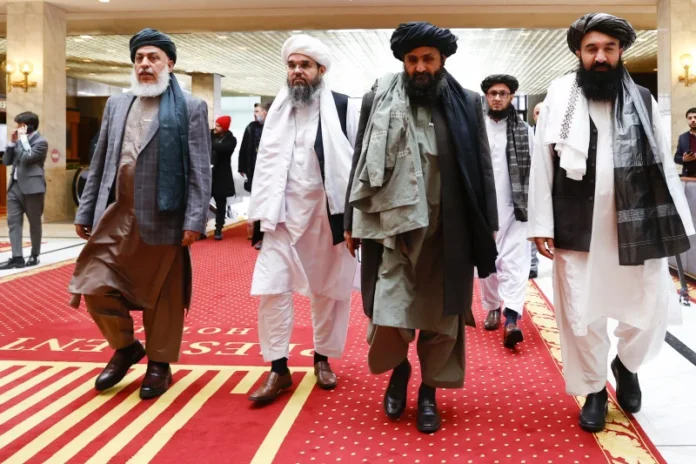New Delhi: Different voices are being heard on what India should do regarding relations with the Taliban in Afghanistan amidst apprehension that the new regime in Kabul would revert back to the rule they had when in power 20 years ago though claiming to be more liberal this time around. However, what is indeed rather apparent is India now has three unfriendly nations to deal on its borders – China, Pakistan and Afghanistan under Pakistan-backed Taliban.
Meanwhile, India stepped up its diplomatic move with Prime Minister Narendra Modi speaking to Russian President Vladimir Putin with the Russian side issuing a statement that the two leaders “agreed to form a permanent bilateral consultations,” on Afghanistan. Even as Modi and Putin discussed the prevailing situation in Afghanistan, it is significant to note that National Security Adviser (NSA) Ajit Doval chaired a meeting of the NSAs of the BRICS (Brazil-Russia-India-China-South Africa) where India “raised the issue of cross-border terrorism and activities of groups such as the Lashkar-e-Toiba and Jaish-e-Mohammed which enjoy state support and threaten peace and security.”
Surely, India cannot forget 1999 IC-814 Indian Airlines hijack to Kandahar when the leader of Al Umar Mujahideen, Mushtaq Ahmed Zargar, one of the three terrorists, who, along with JeM chief Maulana Masood Azhar and Omar Sheikh of Harkat-ul-Ansar, were released in exchange for over 150 hostage on December 24.
But, one thing is certain that the longer the Taliban regime continues in Kabul, this would have far-reaching geopolitical impact in the region not favourable to India, and most former Indian ambassadors in Afghanistan and experts feel that India should not immediately “legitimize” the Taliban but adopt a ‘wait and watch’ policy till the situation normalizes in the war-torn country and a new government is formed.
Expressing their concerns over the situation in the war torn nation at a discussion at the Press Club of India on “Afghanistan and the Challenges Ahead” they felt that India should have at least a minimal level of engagement with the Taliban, keeping in view the country’s long-term strategic aims and interests. However, they felt that the Indian establishment made a mistake by not engaging with the Taliban and this is something that needs to be examined in detail considering that the indications and actions of the Taliban in Kabul are rather different from what the leadership spoke in Doha during the talks with the US which withdrew from that nation after fighting a war for 20 years with another loss of face on the international arena.
They said that even China and Russia engaged with the Taliban and extracted promises that the Taliban would not allow the Afghan soil to be used against them by terrorist groups like Uighurs of China’s Xinjiang province. Russia also extracted similar promises in exchange for its support to the group. Both cultivated relationships with the Taliban parallel to the Americans dialogue with the Taliban to exit Afghanistan through a deal to what the Americans called a “peace deal”. So, was it a strategic mistake of India? perhaps for its too much dependence on the US and coalition partners. According to the experts, India has been the only loser having invested about $ 3 Billion on capacity building and developing infrastructure projects in Afghanistan.
Why should India not legitimize the Taliban though the group has achieved military victory at a pace no one ever believed and will become the de facto rulers of the country, albeit in association with all ethnic groups to ensure there is no major opposition to their rule? Gautam Mukhopadhyaya, who served as an ambassador in Afghanistan, opines that India should be the last country to accord legitimacy to the group and should not jump into any hasty recognition of an Islamic ‘Emirate’, which he believes, will have wide-ranging consequences for the region once it is firmly entrenched in power in Afghanistan.
Though Mukhopadhyaya did not say how the return of the Taliban to power in Afghanistan after 20 years will directly impact the situation in Kashmir or any other part of India, he warned that the defeat of the world’s superpower at the hands of the Taliban that was supported in its war by a range of global terror organizations in Pakistan and Central Asia would provide a psychological boost to global terror organizations. Mukhopadhyaya said it was difficult to predict how long the Taliban would continue in power, but their coming to power would undoubtedly have an “inspirational” impact on global terror groups.
Commenting on the Taliban’s offer of friendship with India in their media interviews, the former ambassador cautioned that “India should not get deluded by their offer of friendship to India.” The Taliban leaders in their media discussions have pledged that they will not allow the use of Afghan soil against any country. “Even if we talk with the Taliban, what is the guarantee that other groups will not carry out sabotage activities in India?” Mukhopadhyaya said.
Regarding geopolitical impact in the region, Mukhopadhyaya said that the strategic space in Afghanistan vacated by the US would be taken over by China, Russia, Pakistan, and Iran. With the Taliban’s proximity to Pakistan, China having moved closer to the Taliban by inviting its top leadership to Tianjin a few weeks ago, Beijing having developed a deep interest in Iran after the US sanctions against Tehran, and Russia has moved closer to Pakistan under the new global political situation poses a serious threat to India’s interests in the region. According to Mukhopadhyaya, this becomes a matter of great strategic concern for India. Such a situation is not favourable to take any immediate decision regarding legitimizing the Taliban.
While agreeing with the concerns raised by Mukhopadhyaya, Vivek Katju, another former ambassador to Afghanistan, wants India “to open up directly with the Taliban”. “Despite their religious orientation and connections with Pakistan and their conduct when they were in power in the 1990s, I advocated that India must talk to the Taliban to explore opportunities”, he stated. Stating that Ashraf Ghani, soon after becoming Afghanistan’s president, went to Rawalpindi to meet the Pakistani Generals to solve the problems with the Taliban. He turned towards India only after Pakistani Generals snubbed him. But his first effort was to befriend Pakistan in the interest of Afghanistan. “Hence, we need to be practical, talk to the Taliban and establish relations with them though we have lost much time,” he opined.
Shakti Sinha, Director in AIPRIS, US Assistance Mission in Afghanistan, commenting on the current situation in Afghanistan, said that there was fear among people. Still, there was no violence, unlike during the Taliban rule in 1996. “India’s fears are somewhat unfounded,” he said. Sinha said there is a considerable Afghan population who want friendship with India. “There is no need to panic”, he said.
While most participants at the discussion spoke about the pros and cons of opening talks with Taliban, journalist and author Ved Pratap Vaidik, who has specialized in Afghanistan affairs, appeared to be rather upset that he had not been consulted by the Indian Government on the issue so that he could lend his expertise on Afghanistan and that he had a suggestion on how to move forward. Vaidik who said that he had been associated with Afghan leaders for the last 55 years and claims to know almost all of them had been talking daily to Afghan leaders ever since the Taliban took over Kabul on August 15.
He advised that India should not take an “anti-Taliban stand” all of a sudden. “India should hold a dialogue with the Taliban directly. If Russia, China, and the US can talk to the Taliban, why can’t we talk to them”, he said. “There is no need to recognize them immediately, but we should negotiate with them because the Taliban has become a reality in Afghanistan,” he pointed out.
The Taliban are mostly from the largest ethnic group in Afghanistan, namely, Pashtuns who are Sunni Muslims and make up more than 42 per cent of the population and have dominated Afghan politics since 18th century. Though Taliban are currently in control of the country, what has to be seen is how do they manage with the more than a dozen ethno linguistic groups like Tajik, Hazara, Uzbek, Turkmen, Baloch, Aimaq, Pashai, Gujjar, Arab, Kyrgyz, Sadat and others. Apart from these groups, the Taliban are facing opposition from the Northern Alliance led by the Uzbek warlord Rashid Dostum who fought with the Soviets against Mujhadeen before changing sides and effectively setting up his own stronghold in the northern city of Mazar-i-Sharif and later fleeing to Uzbekistan after Mazar-i-Sharif fell to Taliban.
– The writer is a senior journalist and media consultant. The views expressed are of the writer and do not necessarily reflect the views of Raksha Anirveda.
– The writer is a senior journalist and media consultant. The views expressed are of the writer and do not necessarily reflect the views of Raksha Anirveda.






